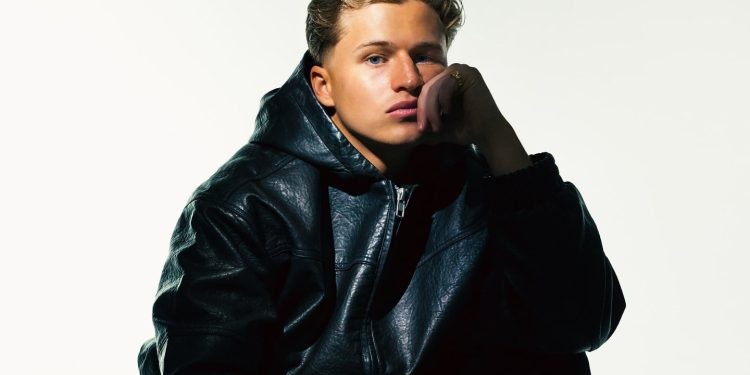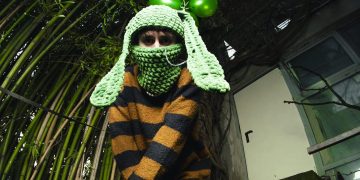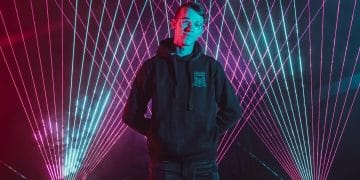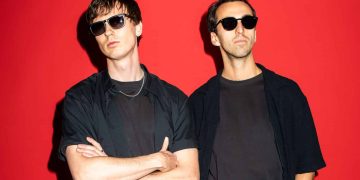Portola Festival Founder Danny Bell sat down for a chat before the event to discuss his career trajectory, festival logistics, and favorite artists on the bill.
Making its debut at San Francisco’s Pier 80 last year, Portola Festival has already made a splash in the dance music community. Determined to bring forward a different side of electronic dance music in the US, Portola’s made quite the statement. Its sensational lineup hosted a wide range of world-class artists. With legendary names like Fatboy Slim, Flume, The Chemical Brothers, Four Tet + Floating Points, Mochakk, and Peggy Gou, it was impossible not to be left in awe.
While hosted by Goldenvoice, Portola is truly the brainchild of the brand’s VP talent buyer, Danny Bell. No stranger to live events, Danny has served in similar roles for years. He began his illustrious career in the music industry as a talent buyer for HARD Summer while still attending USC. Shortly after, Danny moved on to his current position with Goldenvoice. It was there that he found a home for Portola Festival, inspired by a life-changing trip to see world-renowned electronic dance music artists throughout all of Europe. That was the genesis of what we know today as Portola.
After last year’s debut, many were skeptical and curious to know more about how this major, new festival seemed to appear out of nowhere. At the time, attendees were insatiable, flooding the festival grounds with a lust for this new, one-of-a-kind experience. While there were some logistical hiccups on the first day, many left the festival satisfied and looking forward to the next year.
We sat down to chat with Danny Bell to get the full story ahead of the second edition of Portola Festival. Grab your last-minute tickets via the AXS site now and continue reading for our interview below!
Hi, Danny! Thanks for taking the time to chat with us today. Before we get into the details of Portola Festival, let’s talk a little bit about you. Can you tell us about how you first got into talent buying and what led you to where you are today, as VP talent buyer of Goldenvoice?
Thanks for wanting to chat with me! Yeah, so I’ve been putting on concerts since I was 13. I started by putting on a concert at my middle school/high school; it was a 7th through 12th grade school in New York. I joined the rock club, the Frock Club, and we got 500 bucks from the school to produce a concert in our gym with school bands every year. I thought those guys were funny and I liked rock music, so I joined the club and we put on the concert, and I was hooked.
The next year I was in a band and wanted shows to play, so I’d book various shows around New York City for myself and some other high school bands at the Knitting Factory and a few other places. I loved it. Then, from there, I went to Coachella when I was a senior in high school to go see Rage Against the Machine. When I was there, I was like, “This is what I wanna do for a living, this is awesome,” and I was just enamored by booking and programming festivals. Then, when I was in college, I met Gary Richards, who was the founder of HARD, and I told him, “Give me work, I’ve put on shows before.” He ended up hiring me and I ended up booking HARD with him for five years from 2011 to 2015. At the end of that, it was coming time to move on. Then, Goldenvoice hired me to go and work in San Francisco and start over up there.
Since then, I have just been working and building up the office, and I’ve always had this dream of creating Portola. I’ve booked over 30 festivals over the years since HARD Summer. That was the first. I also did ten Holy Ship!s, and then I did a two-day in Vegas, and Porter Robinson‘s Second Sky, but Portola is my personal passion project. In 2021, I got Goldenvoice to buy in and make it a reality, and now here we are, 12 days out from year two.
Thank you for sharing! 13 is so young to start off. That’s awesome that you followed that passion throughout your life.
Yeah, you know, I still love it. It’s a blast.
I’m so glad to hear that. You found your passion, and you continue to live it. Not everyone can be so lucky.
Yeah, I’m very lucky.
You’ve mentioned that you were inspired to create Portola after a trip through Europe, and attending shows in places like Ibiza. What specific experiences and emotions do you recall contributing to that inspiration?
Well, it was actually during my short seven months off between my time at HARD and the time I started at Goldenvoice. I was at HARD while I was still in college full time, so I never got to take time off after college and take a trip. So when I had this time off, I finally had the time for it. I booked a one-way ticket to London and I made a budget for myself. I said, “I’m gonna go in and adventure, try to go to as many places as I can, and stay there until I run out of money.”
It was actually the whole trip that really influenced me. It was fun because I was able to go visit a lot of the friends I’ve made over the years through HARD, a lot of DJs, and some other promoters and managers in their hometowns in Europe. I did everything on that trip, from going to Field Day in London where Four Tet and James Blake were headlining to seeing King, Bicep, and Motor City Drum Ensemble. Then, I went to Sonár in Barcelona, which was really great. I gotta say, it was the thing that opened my eyes.
It was 6am after the first night, after partying for ten hours. John Talbot was closing the stage in his hometown and there were mothers and daughters dancing together. It was really cool because I saw what adult veteran dance music fans look like, how they like to party, and how it’s actually more about loving the music versus trying to be part of something where you have to dress a certain way. One of the beauties of dance music is that it is all about self-expression, freedom, and inclusion. It was just great seeing that kind of a different form where it’s a family thing and they’re all dancing and experiencing this love together.
From there, I went to Ibiza for my first time. I expected to be there for three days but ended up staying for 12, and I went to a lot of the clubs. I got to go to Space in its final year, which was really cool. I got to go to Pikes, which was Freddie Mercury‘s old vacation home. There were parties in his old bedroom called The Funhouse, and it was just a great, eye-opening experience seeing all of that. From there I went to Berlin and Berghain, and a few other parties, like Mecca. I really enjoyed just seeing what happens in these markets where dance music has been around for a long time, and it’s not something new that people are trying to latch onto.
That whole trip inspired me to put together this festival concept that is really based around what’s next for electronic music fans in America, after you’ve been a fan for 15 years, have gone to all these events. It’s inspired by that feeling that you’ve outgrown some of the other offerings that we have here. On top of that, it’s an event focused on career electronic artists, where you’re at a festival with DJs and electronic acts, but you’re not gonna hear the same track more than once because each artist has such a unique sound of their own catalog to play. Those things combined are what really inspired me to create Portola.
So is it safe to assume that your own music taste has a big influence on the lineup for Portola?
Oh, 100% yes.
On the topic of the lineup, I know we’re only on year two, but I noticed that the billings have been pretty diverse. What kind of efforts go into diversity and representation within Goldenvoice, and within your own projects?
As far Goldenvoice goes, it’s something very important to us, and definitely something we’re focused on. It’s a very conscious effort. I will say it’s very important. As I mentioned, a large focus of this festival, but more importantly this whole genre and community of musicians and concertgoers, is that it’s all about inclusion. If you look at the history of electronic music and house music and how it started, it really was all about having a safe space for people of all different sexual orientations and races to come together and dance and have a good time. So with that, it’s part of the duty of someone in my position who’s able to curate an event, to make sure everyone is represented. The good news is that today there are so many good artists from so many different sexual orientations, races, and backgrounds that it’s much easier than it once was. And like I said, it is definitely a conscious decision.
You mentioned in another interview that Portola was six years in the making. What kind of efforts went into finalizing such a long-term plan and turning it into a successful major music festival?
A large part of those six years was just constant brainstorming and clarifying the vision. I’ve got so many folders of mock lineups, and that’s just my hobby. I love to do that, especially when I come back from a trip or come back from a show, and I’m inspired by certain things. It took that long for me to really dial in what the show would be for. The timing was right, with these artists coming to the forefront now in America, and more than anything, just finding the right venue and partners. Now that is all coming together in San Francisco, where I’ve been living for a while.
So, it was an embryo six years ago, an idea of wanting to do this type of festival. Gradually, over time, all the other pieces fell in place. And once one piece falls into place, it’s kind of like a domino effect. Then I’m able to focus on other aspects of it, whether it’s the lineup or the name. I didn’t have the name Portola until a year before we launched it, but I was always thinking of what the right name would be. For me, it is very difficult coming up with a name that has a good ring to it, that sounds good but also has a good meaning behind it, that is genuine and just grasps the whole experience.
So, what led you to the name Portola?
I had, I don’t know, 100 different working names over the years and I’m lucky to have a great graphic designer who’s a part of our team. I would fire off inspirations of art and just random ideas and have them put them together for me, just to see what they looked like. One day, I was just thinking of Portola, who is obviously the explorer who found California and Northern California. When I was doing some further research into the name, I learned that in 1909, the city of San Francisco produced the Portola Festival, but that was more of a parade and a party that was San Francisco telling the rest of the world it had reopened for business after the earthquake of 1906. It was a big celebration and a big welcome back. So obviously, after the pandemic, and launching a new event in San Francisco, it just felt right.
It was kind of perfect with that because this is a new festival, and San Francisco historically has one of the best electronic markets in the country, especially in our great underground warehouse scene. It’s been really famous, and a lot of this music initially started in the warehouses. It all just felt like it would work, and that’s how the name came together.
What crazy timing, starting Portola after COVID and the reopening of the city.
Yeah, it was that fact that made me realize it’s the perfect name for this. It just works, seeing what it did for the city over 100 years ago.
Was that the last push you needed to make it happen?
The name wasn’t what pushed it forward. I knew I was gonna do it, but that name is kind of what solidified the plan and what made it all click, come together, and make me say “Okay, the time is now.” It’s all these different things that just fell into place, like the venue.
Speaking of the venue, and thinking back to the festival debut, we’re aware that there were some logistical issues last year, particularly with overcrowding at the Warehouse Stage. How did Goldenvoice address these issues, and how are you guys coming better prepared this year and moving forward?
Well, you know, we put so much time into our logistical plans last year, and every first-year festival on a new site is gonna have some issues. It was unfortunate that the Warehouses Stage was where these issues took place, but we did fix it by the second day. We just needed to set up a new entrance plan to make it more streamlined.
Sunday was really great. This year, we’ve made a bunch of changes to the site. We actually started working on our new plan that second day of the festival, going over what went wrong and how we could fix it, really trying to identify the issues that led to the issues. Once we did that, we made a conscious decision to orient the Warehouse Stage in the opposite direction. The stage is now on the opposite end shooting out, and what we’ve been able to do is build one massive entrance that’s way bigger than what we had last year, but it’s also central within the middle of the festival now.
The entrance is close to where the Pier Stage is and directly west of the Ship Stage, so it’s a way more conducive flow between all the stages and there are now tons of exits along the outside. It’s a much easier free flow, where you walk in from one end and then out on the sides. We spent hundreds and hundreds of hours on this, and I really think it’s gonna be much better. I’m also knocking on wood as I’m saying that, because a festival is a living, breathing thing and the only way to figure out what works and what doesn’t work is by trying it. But like I said, we have all of our best people on it, and teams who have done hundreds and hundreds of festivals, and we feel good about it here.
With such a major festival coming to a metropolitan city like San Francisco, I’m sure there was a lot of planning and a lot of work to make that happen. What were some of the biggest challenges that you faced behind the scenes with the Portola debut?
Oh, man. If you do any freestanding event of this size in a public space, you have to deal with everything from layout, public safety plan, sound plan, and production plan. It’s so much, but really every festival is the same. It is not for the weak stomach. It takes a lot of planning, and I’m just lucky that at Goldenvoice we have such a great, experienced team that cares so much and was ready to tackle anything. They came in here, just did what they do best, and dealt with it all. We have a team who works on this show 12 months of the year to work through every little detail and element to make sure it’s a great show, that it looks great, and everyone, most importantly, is safe.
Was there any one thing that posed a bigger challenge than anything else?
No, not one thing in particular. Just putting on a massive event. There are 1,000 different elements and things you need to work through, from power to running water. There’s water on site for people to fill up their water bottles. Countless things. That’s the beauty of having such an experienced team: they know everything we need to do in order to produce a full-fledged festival, and we just attack it like that.
Based on the Portola debut and public concerns about capacity, do you think that San Francisco is the right home for the festival? Do you have plans to expand or make any major changes in the future?
100%. We just hope to keep improving year after year and making the show better. That’s the best thing about being able to return to a site: you’ve done it once. Everyone’s better at everything the second time they’ve done it. You’re able to really learn from your mistakes, see what worked, analyze that, and try to improve. Portola is a very San Francisco-centric festival and I do not plan on taking the Portola brand anywhere else. It doesn’t make sense, and this is definitely something I hope will be an annual event in the city of San Francisco for a long time.
On that note, what kind of legacy do you hope to leave behind with the Portola Festival?
We really hope that it’s viewed as something that the people of San Francisco are proud to have in the city and are excited about going to every year, something that makes them enjoy living here more and is right in their backyard. I hope this is a great opportunity for people who don’t live in San Francisco to come back to the city and really see how great it is. San Francisco is a punching bag for the mainstream media. It’s an easy target, but the city is awesome and it’s doing great. I really hope this can highlight how good the city is right now, that people can have pride in it, and it keeps bringing people back to the city.
On top of that, I think it’s important because the city of San Francisco and the concert fans have been such large supporters of these specific types of electronic artists, left-of-center pop and indie artists, and other stuff like that. This really shows the world how cool, open minded, and interesting our music market it really is. I also just hope people have a blast and are able to tell their grandkids about the great weekend they had at Portola one year, or become even closer with friends. Some of the best weekends of my life were at music festivals with a great group of friends. There’s great music and great memories. I just hope the legacy is simply based on that.
What has the feedback been like for you on the industry side of things, from people on your team to coworkers on other teams or just acquaintances in the industry?
It was really overwhelmingly positive. The great thing about the music community, especially, you know, with the agents and managers and artists I work with, is that they understand the place that this festival has in the music world and the need to be filled. More than anything, they’re really happy that it was successful in that we were able to have over 30,000 people come to a show with these types of artists in America. It’s really promising, and it’s given a large home and platform to a lot of artists. The support has been great. I’ve been doing this now for 13 years and I have a lot of great friends and relationships in the space, so it’s great that everyone is as supportive as can be around this festival.
Finally, who are some of your favorite artists on the lineup that you recommend people check out this year?
Barry Can’t Swim, Salute, and Basement Jaxx. The Chris Lake B2B Armand Van Helden set will be really special. Labyrinth is amazing live. Who else… Jockstrap, Little Dragon, Charlotte Adigery, and Bolis Pupul are amazing. Charlotte’s a force. And then all of the other big names. I think everyone’s gonna really bring it and give some great performances. Wherever you go at all times, there’s gonna be something great happening. Oh, also, DJ Koze rarely plays in the US and I’m glad to be able to provide a home for him.
Awesome! Is there anything else you’d like to share with people?
Just thanks for the support and get there early, because you’re not gonna wanna miss the first acts of the day. And the good news is it’s over at 11. So, just a nine-hour sprint each day, and then you could rest up the rest of the week.








